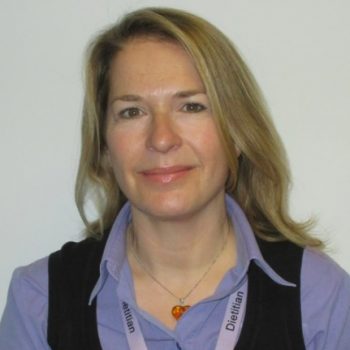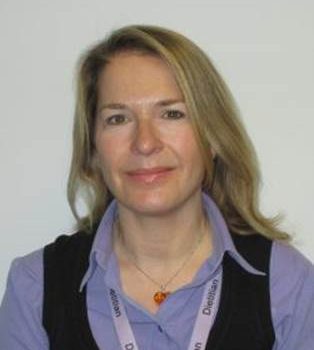NIHR research award for Gillian Gatiss, Addenbrooke’s liver transplant dietitian
Gillian Gatiss, a dietitian in the Addenbrooke’s team that works with patients awaiting liver transplantation, has been awarded the HEE/NIHR Clinical Doctoral Research Fellowship through the ICA HEE/NIHR Integrated Clinical Academic Programme for non-medical healthcare professions. She is set to advance knowledge through her PhD at the University of Cambridge about how the nutritional status of patients with liver cirrhosis can be improved, focusing on developing an individualised approach to their nutritional treatment.
 For patients with liver disease, eating an appropriate diet is anything but straightforward. Up to 60,000 people in England and Wales have cirrhosis and numbers are rising fast. As the disease progresses, patients often experience muscle-wasting combined with either increased or decreased fat stores.
For patients with liver disease, eating an appropriate diet is anything but straightforward. Up to 60,000 people in England and Wales have cirrhosis and numbers are rising fast. As the disease progresses, patients often experience muscle-wasting combined with either increased or decreased fat stores.
Gillian explained: “My specific job as a dietitian is to assess patients presenting for liver transplantation. I check that they are nutritionally fit and if not, we put a plan in place to improve their nutritional status before transplantation. Patients are so variable. We need better ways to help each person meet their energy requirements, eat the right food and stay as strong as possible. For example, we measure weight but the liver cirrhosis means that people are often retaining a lot of fluid and this obviously means the weight measurements can be misleading. The research award means I’ll be able to look at completely new ways to assess and respond to people’s individual needs”.
In 2011, Gillian undertook the Masters in Clinical Research, supported by NIHR through what’s now called the ICA programme. She said: “I wanted to be able to do research in practice. I was questioning how we could improve things. With the liver patients, rather than a one size fits all approach, we are looking to tailor what we do for our patients”.
Support from the Addenbrooke’s Charitable Trust (ACT) and the NIHR Cambridge Biomedical Research Centre (BRC) was key to Gillian’s success, enabling her to develop her 2016 NIHR proposal.
The ACT/BRC Fellowship gave me the time and support I needed to develop a competitive doctoral application and it meant I could continue on a clinical/academic pathway – Gillian Gatiss
Gillian said: “After the Masters, I went back to working clinically with patients but was keen to apply for research grants. I realised the next step was to work on a PhD. But I needed support to put the HEE/NIHR Doctoral Research Fellowship application together – to review the literature, discuss the research with supervisors, develop the research protocol, consult with patients and the public, determine the training programme and finances – and I was so lucky to be one of the first recipients of the ACT/BRC internal research Fellowships. The ACT/BRC Fellowships, which are now in their third year, are intended to provide time and support for nurses, midwives and AHPs to develop competitive doctoral applications. That Fellowship enabled me to work on the NIHR proposal three days a week for six months and without it I would never have managed to pull it all together. It meant I could continue on a clinical/academic pathway. I didn’t want to leave patients behind. I wanted to carry on treating them”.
Gillian’s research will be in three parts. She explained that the first step is to rethink how patients’ energy requirements are worked out: “Dietitians use predictive equations to calculate people’s energy requirements but these simple calculations were originally designed for use across populations and not for individuals. So for this project we’ll test a new portable calorimeter – an energy calculating machine – to determine if it can give us much more precise results for each individual patient. One patient who is on our steering group said: ‘it would be fantastic to know my actual requirements”.
“The next step is to consider how appetite works in people with liver disease. We don’t know very much about how liver disease affects gut hormones, some of which stimulate appetite and some of which suppress it. But we do know that people with liver cirrhosis often have a poor appetite and they might feel full very quickly. So we’ll look at satiety after eating and levels of gut hormones in two groups – one healthy group and another group of people with liver cirrhosis – and we hope that any variations between the two groups may indicate treatments to boost appetite”.
“The final strand of our work will be to ask patients about their experiences with diet during their illness and we hope that something that we have never thought of might come up, which could be used to improve patients’ outcomes”.
I am just so delighted to see Gillian take this forward with the HEE/NIHR Fellowship. These are nationally very competitive awards, and I want to thank the ACT and BRC for funding the internal research Fellowships that provided the time and support she needed to be successful – Professor Christi Deaton
Professor Christi Deaton, Florence Nightingale Foundation Professor of Clinical Nursing Research, said: “This research has the potential to improve nutritional assessment and management, and hopefully the outcomes of people with liver cirrhosis. It will have implications for other patient groups as well. I am just so delighted to see Gillian take this forward with the HEE/NIHR Fellowship. These are nationally very competitive awards, and I want to thank the ACT and BRC for funding the internal research Fellowships that provided the time and support she needed to be successful”.
Find out more
The next round for the BRC/ACT internal research fellowships will be held in Autumn 2017. Please contact christideatonpa@medschl.cam.ac.uk to find out more.
About the ICA HEE/NIHR Integrated Clinical Academic Programme
About Professor Christi Deaton



